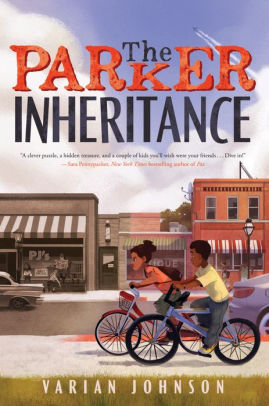The Parker Inheritance, the latest by Varian Johnson, is a different sort of book from his light-hearted, fun middle grades heist novels (see The Great Greene Heist). Part historical fiction, part realistic fiction, The Parker Inheritance focuses on a small Southern town complete with a checkered past, colorful characters, and a mystery.


The book opens with the mystery part: Candice and her mother have just moved to her grandmother’s former house in a small, Southern town. Candice misses big-city Atlanta and assumes she’ll be moving back at the end of the summer, after her mother and father have patched things up. When Candice finds a mysterious letter addressed to her, but originally directed to her grandmother, her curiosity is piqued; she determines to solve the mystery that her grandmother couldn’t, helping restore her grandmother’s reputation in the process. Candice gets more than she bargains for as her new friend Brandon and she end up uncovering quite of a bit of unexpected, racially-charged history lurking beneath the quiet surface of their town.
Janie and Betsy team up to discuss the book’s literary chops: does it have what it takes to win a Newbery? Do we *love* it as much as some of its other critics?
Betsy: Janie, I don’t know about you, but I was anxious to read this one. I really enjoyed Johnson’s heist novels; they were just such good fun and featured a nicely diverse cast of characters without “race” being part of the story’s main point. I heard an interview with Johnson on the Scholastic Reads podcast {link: https://player.fm/series/scholastic-reads/varian-johnson-and-the-parker-inheritance} before I read this book. It highlighted the Southern town at the center of the mystery. Johnson pulled from his own home town of Florence, SC, for the setting and the book’s central historical plot. Janie, what did you think of the setting and the historical aspect to the book? The mystery really hangs on those elements, and I thought the historical elements were nicely done.
Janie: Betsy, your question made me think about the “small southern town” angle, and it seems to me that in stories of this type—To Kill a Mockingbird being the prime example—the town is more than a setting. It’s almost a character. Lambert, South Carolina, like Maycomb, Alabama, is “the town”—i.e., the settled atmosphere of racial bigotry that has haunted the south for 200+ years. In the present time it’s not so pronounced, but Candice and Brandon find that they’re sitting on a dark history that needs to be brought to light before healing can take place. Once the story is underway, that narrative shifts back and forth between the present, where the kids are searching out clues, and the past, which reveals the significance of those clues. The present is more of a “kid’s story,” while the past, with a few more “mature” elements, could have been a novel for adults, as the main characters are all teens or grownups. I’m not sure how successful that juxtaposition was. The historical narrative felt more authentic to me, while at times the mystery seemed a little contrived.
Betsy: I agree, Janie. The historical narrative was really interesting and well done. Johnson managed to shed light on some touchy racial issues, particularly the school segregation issue, through tennis, of all sports. It was a refreshing angle and made for an engrossing story. The resolution of that part, complete with its ties to present day Lambert and the mystery Candice is solving, introduces the idea of “passing,” which might be a totally new idea for a lot of kids. As good as the historical part was, though, what troubled me was the subtle link between the Civil Rights movement (racial equity) and the contemporary gender and sexuality issues swirling around. I know many people equate racial rights with sexual rights (i.e. black and white people should be able to get married and so should same sex couples). What did you think about it?
Janie: That bothered me, too. The author seems to be making a clear connection between the struggles of the past and the new frontiers of civil rights. It’s supposed to be a surprise to the reader, but (spoiler alert!) Candice’s father has a new love interest, and it turns out to be a man. Dad is also presented as conservative and religious, so I felt it was a not-so-subtle message to Christians to broaden their views. Brandon, also, has a close friend who has recently come out as gay—keep in mind these kids are still very young and may not totally understand their sexuality—and Brandon’s own inclinations are murky.
It’s worth pointing out that many African Americans, especially those who are committed Christians, resent their civil-rights history being linked to gay rights today. When I catch a whiff of an “agenda,” I tend to develop some negative feelings toward the whole work. I don’t mean to cast aspersions on Varian Johnson; in The Great Greene Heist he managed to present interesting, diverse characters without getting into their sexual identities. How about you, Betsy? Do the novel’s virtues offset its drawbacks?
Betsy: Tough question! One virtue of the book is that there IS a recognized agenda (or, at least, thematic elements transparently linking the historic Civil Rights era to today’s gender/sexuality rights movement), and that is often easier to discuss with kids than the more subtle iterations lurking in the background in so many books. That being said, my bigger concern from a critic’s perspective was that the novel was trying to cover too much. It’s hard to do justice to such weighty issues as “passing,” school segregation, vigilante violence (such as the white men’s treatment of the black men in the historic segment), bullying, gender confusion, sexual preference, parent-child relationships, AND throw in a mystery on top. So, because the book comes to some different conclusions from what I believe Scripture teaches regarding gender/sexual issues and because it tries to cover so many things at once, it’s not the powerful story it might have been. Johnson is a talented writer who manages to people his books with so many interesting, diverse characters. I think he took on too much at once in this particular volume thematically.
Janie: You raise a valuable point that we need to discuss these issues with our kids, all the more as homosexuality and gender identity show up in children’s books and other media. We’ll hopefully be sharing ideas and resources on how to do this in the near future. For now, though, The Parker Inheritance may not be the best vehicle for that.
Stay Up to Date!
Get the information you need to make wise choices about books for your children and teens.
Our weekly newsletter includes our latest reviews, related links from around the web, a featured book list, book trivia, and more. We never sell your information. You may unsubscribe at any time.
Support our writers and help keep Redeemed Reader ad-free by joining the Redeemed Reader Fellowship.
Stay Up to Date!
Get the information you need to make wise choices about books for your children and teens.
Our weekly newsletter includes our latest reviews, related links from around the web, a featured book list, book trivia, and more. We never sell your information. You may unsubscribe at any time.
FREE Bible Guide!
Get a guide to the Best Bibles for Children and Teens. Perfect for an Easter gift.
We'd love to hear from you!
Our comments are now limited to our members (both Silver and Golden Key). Members, you just need to log in with your normal log-in credentials!
Not a member yet? You can join the Silver Key ($2.99/month) for a free 2-week trial. Cancel at any time. Find out more about membership here.

